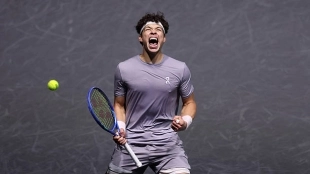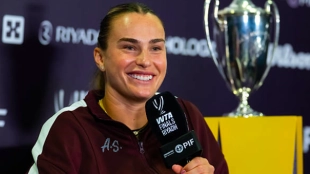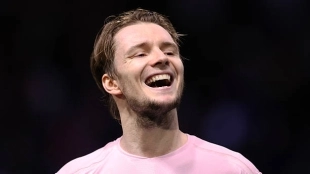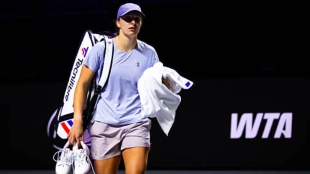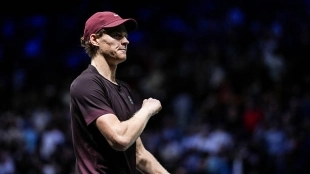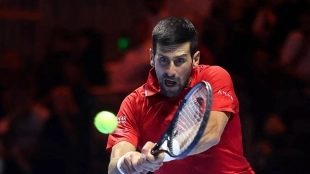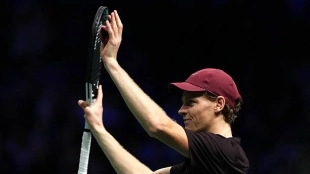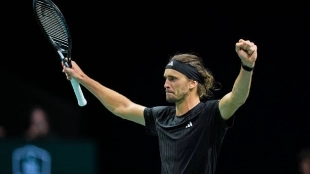
Before enjoying a new final from Carlos Alcaraz, the sensation that Spanish tennis is a storm that never ceases to intensify once again permeates the environment. However, before Alcaraz, Nadal, Ferrero, Moyá, or Bruguera, there had to be an origin, a revolutionary who laid the foundation to pave the way for the ascent of those who followed. That pioneer, in our country, is called Manolo Santana. It doesn't matter if you never saw him play, everyone knows what Santana represents, the prologue of a book that has never stopped writing pages of gold. Then came Manuel Orantes, from Granada, another tremendous champion who, for various reasons, has never received the recognition he deserves. Despite an eleven-year gap between them, their paths converged almost from the beginning, although they did not end up being best friends. What happened between them?
To explain the bond between Manolo and Manuel, let's start with a date: May 1969. The XVII Conde de Godó Trophy final was special, different from the others: for the first time, two Spaniards featured on the Sunday poster. On one side was Santana, at 31 years old, arriving without dropping a set and as the clear favorite for the title. On the other side of the net, a 20-year-old Orantes who threatened to cause an upset, putting the finishing touch to a sensational week. I know the younger ones are eager to know who won the trophy, so I'll ask for a little bit of patience.
At that time, Santana already had a place in the hearts of the fans. With four Grand Slams under his belt, he was an absolute reference, a legend who transcended beyond his own discipline and who would go down in history as the man who laid the foundations of Spanish tennis. Fate then brought him a travel companion, a compatriot who was making waves and seemed destined to be his successor in the public imagination. After winning the Orange Bowl at 17, Orantes' life took a turn when he found himself playing in the 1967 Davis Cup final against Australia. In record time, he took the lead, playing in both the two individual matches and the doubles alongside Santana. They couldn't capture the Davis Cup, but the good news was that Spain now had a second top-notch player.
His talent was undeniable, so it was inevitable that they would meet on opposite sides of the court, thus starting their rivalry in 1968 when Orantes defeated Santana in the Madrid final (6-2, 6-8, 5-7, 6-3, 8-6), only for the Madrid native to take revenge in the final of the Olympic Games in Mexico (2-6, 6-3, 3-6, 6-3, 6-4). The tiebreaker came a year later, in the first all-Spanish Conde de Godó final. A match that began on May 18th and ended on... September 18th! First the rain and then scheduling conflicts meant that the action couldn't resume until four months later when the Granadian triumphed in straight sets (6-4, 7-5, 6-4) to lift the first professional title of his career. Something was born that day, but also something was broken.

"He came in as one of the best in the world, and I was far below, although I had beaten him once," explains Orantes in his biography 'De la barraca al podio', written by Félix Sentmenat. "Clearly, he was the best, the favorite. In the first part of the final, it was seen that I could stand up to him. Four months later, when it resumed, everything went well for me. Since I had beaten him once on clay, I tried to make the match difficult for him, push him out of his comfort zone. As he was the one we saw the most at that time, I tried to imitate him by playing many drop shots and constantly moving him, lobbing him. That was the way of playing that I had in mind," recalls the former world No. 2.
"Beating Santana, who was my idol, the benchmark for everyone, also playing at home, was unexpected. Winning the Godó was like winning Wimbledon for me, I truly felt that way, it meant winning in front of your friends, family, and all your people. I had dreamed of winning the Godó since I was eight, when I entered as a ball boy, but doing it by defeating Santana in the final was very special. For me, that was a key victory, one of those that give you strength to keep rising and believing more in your possibilities," says Manuel, who would extend his professional career until 1984.
TWO WAYS OF UNDERSTANDING LIFE
Anyone who has interacted with our two protagonists would know how different they were in terms of communication, socialization, and even their approach to the circuit. While Santana was outgoing, open, popular, and drawn to the spotlight, his namesake was more reserved, intimate, modest, and distant from the media. This dichotomy only emphasized the contrast between the two champions, two idols that Spanish fans clung to, dreaming of a team that could deliver the first Davis Cup to us. What people didn't know was that behind closed doors, the first frictions had already arisen.
"Initially, the relationship with Santana was very good, only some issues arose later on. His whole environment tended to overly respect him... and having to bow my head in front of people has never appealed to me. I think you shouldn't disrespect anyone, but you shouldn't have to bow down to anyone either," reveals Orantes in the aforementioned biography, where he reviews each stage of his career.
"I remember that in Australia, we trained extensively before playing the final in 1967, but we also had the obligation, as per protocol, to attend cocktails. One day, after training for a long time, we went down to the cocktail, all dressed up and uniformed, but Santana was missing. Then we were told that he didn't want to come because it wasn't official. And I said, 'Well, I'm not going either because I'm very tired.' Later Santana came and scolded me, to which I replied that if it was an unofficial event, why should I go if he didn't? At that moment, I still believed that things were the same for everyone,"
Those who lived through that era recount that Santana, perhaps the most internationally renowned Spanish athlete of the sixties, was always highly protected by all institutions, including the government, which ensured his financial situation remained unaffected. But why so many privileges? Quite simple: for refusing to make the jump to professional tennis. By continuing as an amateur player, Santana not only ensured his participation in the Grand Slams but also in the Davis Cup, a gesture that Antonio Samaranch deemed an eternal favor. Andrés Gimeno, for instance, chose the opposite path, making Santana the one who ignited the tennis fever in our country.

Meanwhile, their relationship fractured once again in a new clash at the Madrid tournament, where Santana, already acting as a director, moved each piece at his whim. "The tournament draws were based on invitation, everything was done through favoritism, if you had a good relationship with the tournament director, everything was arranged," recounts Orantes. "You could be very good, but if you weren't invited, you had no chance. Everything was very false, good people were receiving under-the-table payments while other players of the same level were not, because there was also no ranking. I had won in Madrid for two consecutive years and I told Santana: 'I've won the tournament two years in a row, and I come here and it costs me money. It's not logical that if I stay here until Sunday, paying for my hotel and food, I earn the same as other players who lose on Monday or Tuesday.' He was so angry with me that he didn't invite me the third year."
Reading between the lines, his words indicate that the great figure of Spanish tennis began to regard his successor with suspicion, a young man who was making his way and threatened to push him off the top. "I think initially he didn't see me as a threat; we had a very good relationship. The change came when I beat him for the first time, and then a second time, that's when he started getting upset. Some slightly unpleasant situations arose, like his refusal to invite me to the Madrid tournament after I won in 1968 and 1969. I have always respected it when a young player tried to win, I have been delighted that there have been such good players after me, and I have even helped them," reflects the champion of 34 individual titles.
BARCELONA, TURNING POINT
Orantes interprets that the final in Barcelona in 1969 was the catalyst for everything that followed, which was substantial. For instance, when they faced each other again that same summer in the Kitzbühel final, where Santana emerged victorious (6-4, 6-2, 6-3). These two matches are the only ones officially recorded in the ATP database, although they crossed paths in a total of seven finals. The over a decade gap between them prevented more encounters; in fact, they only shared four seasons while both were active.
By the way, the following year, things took another turn at the Godó, but on different paths. Rod Laver would defeat the reigning champion in the quarters, although the Australian failed to claim the crown. After overcoming Orantes, a certain Santana was waiting for him in the final. There, he would reclaim his throne (6-4, 6-3, 6-4), reigniting the flame of a rivalry that would have no more episodes. After announcing his retirement from tennis at the end of that year, Orantes would once again reign at the Conde de Godó in 1971, an event that always revolved around both Spanish players.
"The one in 1971 was my most complete title, considering I wasn't even a seed, and moreover, the best were there. No one expected it, but I won the tournament again, and the Barcelona Tennis Club saved all the money because I couldn't collect it. Only the professionals were eligible for the prize money; the amateurs were not allowed to," remarks Manuel, who had to overcome rivals like Rosewall, Riessen, or Lutz in that edition. Santana, his great idol from youth, would never cross his path again, although life didn't make it easy for them to forge a friendship.

"It was the logical rivalry between two tennis players who aspired to win the same tournaments. It's true we never became friends, even though we started off well, stemming from being Davis Cup teammates for two years. But then, other issues arose, insignificant details that led each of us in different directions. We respected each other, simply. What isn't true is that I was instrumental in hastening his retirement, as the press claimed. Each person retires when they want," responds Orantes in his book, distancing himself from the narrative that scapegoated him when his namesake hung up his racket.
It perhaps took him a while, but eventually, the Granadian understood the narrative that the press had woven around Manolo and Manuel. Of course, it's difficult to be friends with a rival, Santana wanted to protect his status at all costs, but it's also true that the media, even part of the audience, did not help in bridging the gap between them.
"What hurts me is that in other countries, they don't compare one player to another; they respect them all. They don't talk about one being better than the other, as they do here. To the Spanish press, it seems like the only player we've had is Santana, and I don't understand that. In my case, many people who emotionally identified with Santana failed to appreciate me because they clung to the idea that I had pushed him out," concludes the first Spaniard to claim the Masters tournament. A wound that he still lives with today.
This news is an automatic translation. You can read the original news, Manolo contra Manuel




